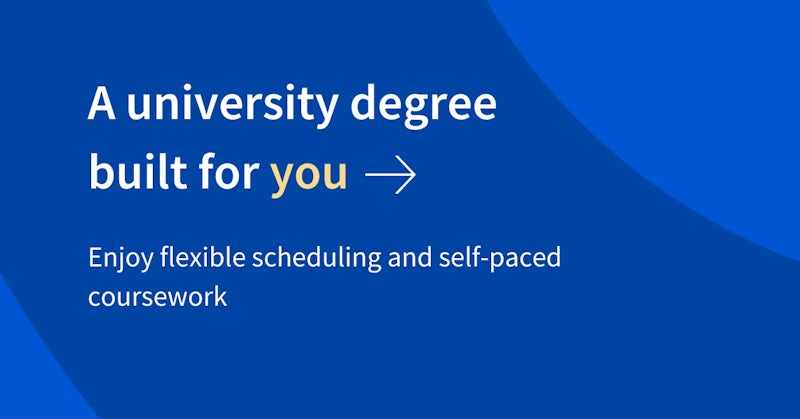Bachelor’s Degree Guide: Resources for Your Undergraduate Education
Learn more about bachelor's degrees, including what it takes to apply, the best major for your career goals, and how to accelerate your time to graduation.
![[Featured image] A young graduate in a cap and gown raises their arms in celebration.](https://d3njjcbhbojbot.cloudfront.net/api/utilities/v1/imageproxy/https://images.ctfassets.net/wp1lcwdav1p1/1Qq3udbUwFaO5P8dppJG6i/ec98b22fd1d8d1f65448d17c89b159ce/twenty20_245b7ddd-aeec-4471-a75d-89d904c0830f.jpg?w=1500&h=680&q=60&fit=fill&f=faces&fm=jpg&fl=progressive&auto=format%2Ccompress&dpr=1&w=1000)
Earning your bachelor's degree can be rewarding—you can deepen your knowledge, develop key job skills, and increase your career opportunities. Even when a company doesn't require a bachelor's degree for entry-level roles, it may be beneficial to have as you advance in your career.
According to the US Bureau of Labor Statistics (BLS), bachelor's degree holders earn a median of $1,493 a week (or $77,636 a year) compared to high school graduates, who earn a median of $899 a week (or $46,748 a year) [1]. Moreover, the same study showed that high school graduates experience higher rates of unemployment compared to graduates with a bachelor's degree.
You may also qualify for more jobs with a bachelor's degree. Georgetown University's Center on Education and the Workforce estimates that 66 percent of "good jobs" will require a bachelor's degree by 2031, up from 59 percent in 2021 [2].
As you consider whether a bachelor’s degree is right for you—and which type of bachelor's program aligns with your goals—keep checking back here as we add more resources to help guide your journey.
Bachelor’s level degree overview
A bachelor’s degree is a significant investment in your education. Understanding what it takes to earn your undergraduate degree is important before beginning the application process. Learn more about choosing an accredited school, transferring previously earned college credits, and the difference between the two most common bachelor's degrees, Bachelor of Arts (BA) and Bachelor of Science (BS).
What’s the best bachelor’s degree to get?
Ultimately, the best bachelor’s degree to get depends on your goals and interests. Beyond considering the most popular majors, you might consider degrees that open the door to high-paying jobs with high levels of satisfaction. Kiplinger ranks options like petroleum engineering, operations research and industrial engineering, interactive design, and applied economics among the top options [3].

Applying to bachelor’s degree programs
A bachelor’s degree program tends to require an array of application materials to help admissions committees learn about you in a few different ways. Learn more about what to gather so you can develop a proactive plan that ensures you have everything you need.
Bonus: Jobs to Pay for College
How to pay for college
The cost of college will depend on whether you attend a public school (either as an in-state or out-of-state student) or a private school. In the US, it's important to submit your Free Application for Federal Student Aid (FAFSA) each year you plan on attending college because that will determine what kind of aid you qualify for. Outside of that assistance, many students apply for additional scholarships or work part-time to cover some portion of their education costs.
How to choose a bachelor’s degree: Choosing a college major
Besides choosing to embark on an undergraduate education, deciding what to study—or major in—is an important step. We’ve got you covered. Learn more about why it’s important to declare a major, how to select a major to support your goals, and other options like double majoring.

Succeeding in college
Applying to college is just one moment of your larger undergraduate journey. Once you begin your studies, it’s important to develop strong study habits, whether you’re learning online or in person.
Career outcomes for bachelor’s degrees
Interested in learning more about what you can do with a bachelor’s degree? We’ve compiled career outcomes for some of the most popular majors so you can better understand the possibilities after graduation.
What Can You Do with a Communication Degree: 10 Career Paths
Bonus: Job Search Guide: Resources for Your Next Career Move
Advanced degrees
Once you graduate with your bachelor’s degree, you have the option of entering the workforce, or you can continue pursuing more advanced education, like a master’s degree. Take a look at three of the most popular master's degree tracks.
Master of Arts (MA) and Master of Science (MS) degrees
Master of Business Administration (MBA) degrees
Article sources
US Bureau of Labor Statistics. "Education Pays, https://www.bls.gov/emp/chart-unemployment-earnings-education.htm." Accessed January 8, 2025.
Georgetown University Center on Education and the Workforce. "The Future of Good Jobs: Projections through 2031, https://cew.georgetown.edu/cew-reports/goodjobsprojections2031/." Accessed January 8, 2025.
Kiplinger. “25 Best College Majors for a Lucrative Career, https://www.kiplinger.com/slideshow/business/t012-s001-best-college-majors-for-a-lucrative-career/index.html.” Accessed January 8, 2025.
Coursera Staff
Editorial Team
Coursera’s editorial team is comprised of highly experienced professional editors, writers, and fact...
This content has been made available for informational purposes only. Learners are advised to conduct additional research to ensure that courses and other credentials pursued meet their personal, professional, and financial goals.